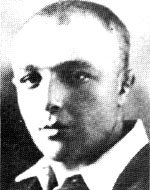Orkevich (Uri), Yosef
Son of Esther and David. He was born in 1911 in Warsaw, Poland, to a conservative family. His father, an avid scholar and Zionist, added to the general education his children received at the local school, as well as the study of Judaism and the Hebrew language and their proximity to the Zionist idea. He continued his evening classes and then moved to a vocational school. In his youth, he was a revisionist youth and joined the Maccabi organization, where he devoted himself mainly to boxing, and a few years later won the title of Warsaw champion and deputy of the boxing champion of Poland. In 1932 he was sent to the boxing team to participate in the first Maccabiah in Tel Aviv and with the help of Lord Melchett, patron of the Maccabiah, the group remained in Israel legally. At the beginning of his career in Israel he worked as a laborer in an orchard in Petach Tikvah and then moved to Haifa where he worked as an electrician and specialized in his profession. In Haifa he joined the Histadrut labor federation and the Haganah, and all the while he continued to train in Maccabi and train young people in boxing. She quickly became involved in the work of the city’s working people and was fond of his generosity and willingness to help the needy. He spent some time at Kibbutz Ein Shemer, where his sister lived, and then acted as a guard at a remote guard post in the Carmel Forest. He was also a member of the unit, and he was remembered as a strong, courageous and tough young man, yet with a soft, loving and caring mind for others when needed. (October 12, 1939), the unit was sent to beat and warn a Jewish policeman who had been found to be transporting information about the illegal immigration to the British. The order was not to take weapons, hot or cold, in order to prevent the possibility of bloodshed.Joseph beat him as ordered and then the policeman drew his gun, shot his head and mountain He was brought to eternal rest in the Haifa cemetery, his name was immortalized in “Pages of Memory” published by Kibbutz Ein Shemer and in the newspapers Davar and Ha’aretz.
